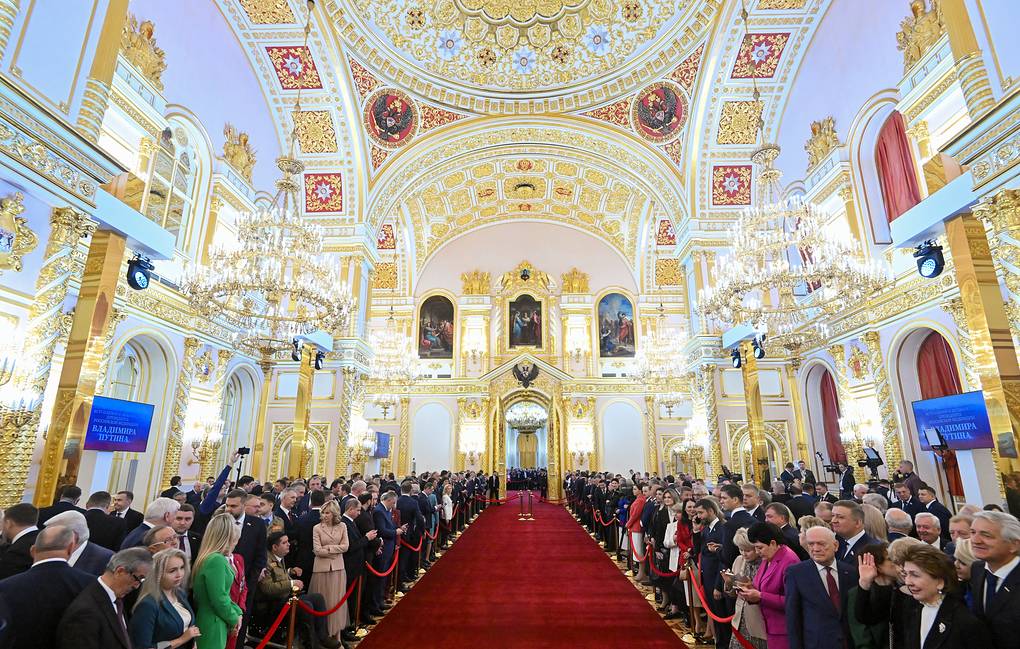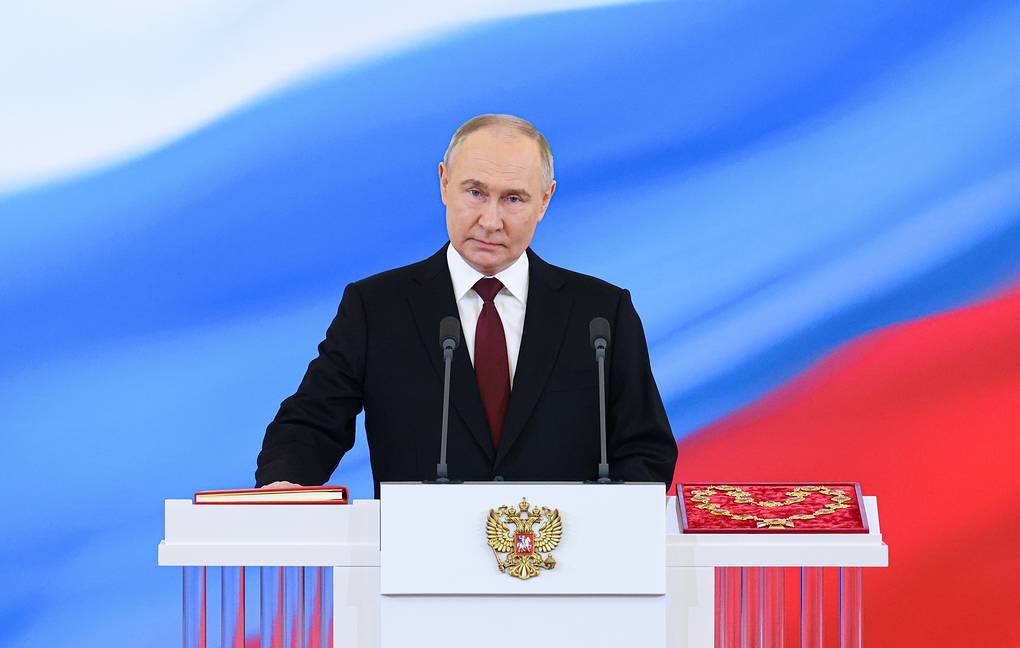MOSCOW, May 7. /TASS/. Vladimir Putin has formally taken office as Russian president for another six-year term, Constitutional Court Chairman Valery Zorkin announced.
Putin took the oath to the people. Zorkin handed him the symbols of presidential power, including the presidential insignia, that is, the golden cross of St. George, depicting the Russian coat of arms and a gold chain with the words “Virtue, Honesty and Glory.”
After being sworn in, the head of state delivered a speech.
The ceremony marks the start of Putin’s fifth presidential term. His first two terms in office lasted four years each. However, the presidential term was later extended to six years based on constitutional amendments. Putin’s first six-year presidential term began in 2012 and the second one in 2018. In 2020, the Constitution was changed to make it possible for him to run for president in 2024. Putin won the election, garnering an unprecedented 87.28% of the vote.

Vladimir Putin’s biography
Vladimir Putin was born in Leningrad (since September 1991 St. Petersburg) on October 7, 1952.
In 1975, Putin graduated from the Department of Law (International Law Branch) of the Leningrad State University. He underwent a retraining course of KGB operatives in Leningrad (1976) and in Moscow (1979) at the Dzerzhinsky Higher School of the KGB of the USSR. In 1985, he graduated from the Andropov Institute of the KGB of the USSR (currently the Academy of the Russian Foreign Intelligence Service, SVR).
Academic degree – Ph.D. in Economics. In 1997, Putin defended a thesis entitled Strategic Planning of the Mineral and Resources Base Reproduction in the Context of Emerging Free Market Economy Relations (St. Petersburg and the Leningrad Region) at the St. Petersburg Mining Institute.
Upon graduation from the Leningrad State University, Putin was assigned to a position in the KGB of the USSR. His first job was in the secretariat and then in the counterintelligence unit of the KGB Office for Leningrad and the Leningrad Region. After a course of studies in Moscow, he was transferred to Department No. 1 (foreign intelligence) of the KGB Office for Leningrad and the Leningrad Region.
In 1985, he was given an assignment at the KGB office in the German Democratic Republic and worked in Dresden up to 1990. He held positions of a senior operative, assistant and senior assistant to the chief of a section. Putin returned to the Soviet Union in January 1990.
Starting from February 1990, he worked as a foreign affairs assistant to the Leningrad State University’s rector and then, as an adviser to Leningrad’s Mayor Anatoly Sobchak.
In June 1991, Putin was appointed to chair the foreign relations committee of St. Petersburg Mayor’s Office.
In 1992, Putin took the position of St. Petersburg’s deputy mayor while retaining the post of the foreign relations committee chief. In March 1994, when Sobchak took over as the head of the city’s administration, Putin was appointed his first deputy. Later, when the posts of the head of the city administration and mayor were merged, Putin’s position was renamed to deputy mayor, chairman of the city’s foreign relations committee.
In August 1996, Putin was transferred to a position at the Russian presidential property directorate in the capacity of its deputy chief. He supervised the directorate’s department of law and foreign property-related matters.
In March 1997, he started serving as deputy chief of the presidential staff and chief of the presidential Main Control Directorate. In May-July 1998, Putin served as first deputy chief of the presidential staff.
Between July 1998 and August 1999, Putin served as director of the Federal Security Service (FSB). Simultaneously, from March to August 1999, he was the Russian Security Council’s secretary.
On August 9, 1999, Russian President Boris Yeltsin said in a televised address that he had made a decision to dismiss the government and asked the State Duma to endorse Vladimir Putin as the country’s new prime minister. Yeltsin said he saw Putin as his successor and hoped that he would manage to “consolidate society”. On the same day, Putin was appointed first deputy chairman of the Russian government and acting head of the cabinet.
On August 16, 1999, the State Duma approved Putin’s appointment as prime minister.
Between December 31, 1999, and May 7, 2000, he was Russia’s acting president after President Boris Yeltsin had declared his resignation thus placing presidential duties in Putin’s hands.
On March 26, 2000, Russia saw an early presidential election with eleven candidates taking part. Putin emerged the winner to have collected 52.94% of the votes in the first round. Communist candidate Gennady Zyuganov was second with 29.21%. The inauguration of the newly-elected president took place on May 7, 2000.
On March 14, 2004 Putin was elected for a second term, receiving 71.31% of the vote in the first round (Communist candidate Nikolay Kharitonov was the runner-up with 13.69%). His inauguration took place on May 7, 2004.
Dmitry Medvedev, first deputy prime minister, was elected Russia’s president in 2008. From May 8, 2008 to May 7, 2012, Putin served as the country’s prime minister.
In 2008-2012, he led the United Russia party (without being the party’s member).
In the March 4, 2012 election Putin was elected president by a 63.6% majority vote in the first round. Communist candidate Gennady Zyuganov was second with 17.18%. Putin took office on May 7, 2012. Starting from 2012, the presidential term of office was extended to six years.
On March 18, 2018 Putin was re-elected as Russia’s president by a 76.69% majority vote. The runner-up, Pavel Grudinin of the Communist Party of the Russian Federation, received 11.77%. On May 7, 2018, Putin took office for a term of six years.
On March 17, 2024, Putin once again re-elected president, garnering 87.28% of the vote, the highest figure in the history of Russia’s presidential elections. He ran in the election as an independent candidate. Communist contender Nikolay Kharitonov came second with 4.31%.
As head of state, Putin is commander-in-chief of the Russian Armed Forces and chairman of the State Council and the Security Council.
Since June 12, 2013, Putin has been the leader of the non-governmental movement All-Russia People’s Front, created at his initiative as a coalition of social and political forces.
Colonel, retired.
Class 1 Active State Advisor (1997).
Holds the Badge of Honor (1988) and Order of Honor (1996), along with foreign decorations.
Speaks German and English.



COMMENTS